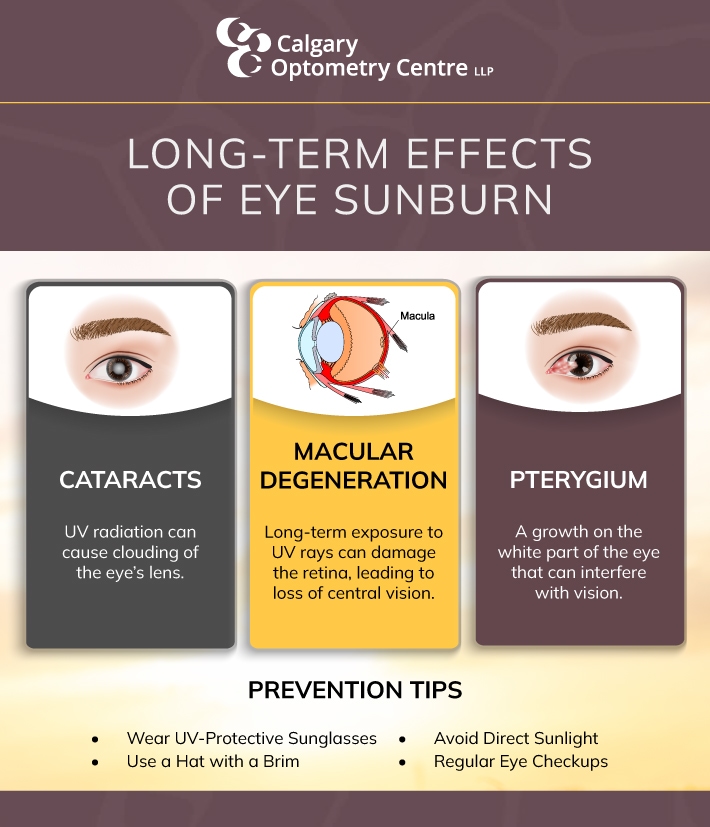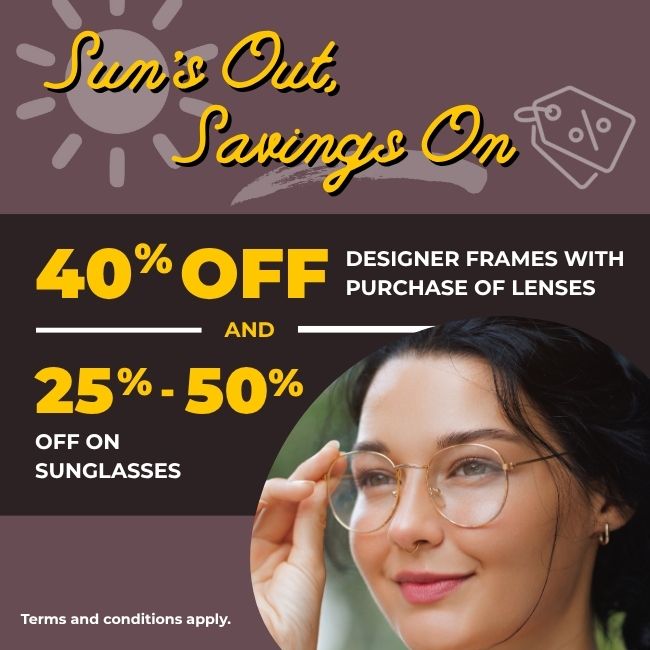Ensuring your eyes are protected from the harsh effects of the sun can be crucial for maintaining your eye health. While most people are aware of the importance of protecting their skin from harmful UV rays, it’s also important to know that your eyes can be equally vulnerable to sun damage.
Your eyes can indeed get sunburned, and the condition, known as photokeratitis, can lead to various uncomfortable symptoms and potential long-term damage. If you do experience eye pain, that may be a good reason to visit us for emergency eye care—especially if it’s sudden. Burning sensations in your eyes can also be caused by dry eyes, so getting a clear diagnosis with an eye exam can be crucial for taking the right steps to protect your sight and eye health.
Understanding UV Radiation
To understand how the sun can affect your eyes, it’s necessary to first grasp the basics of UV radiation and how UV light can affect your eyes.
Types of UV Radiation
- UVA: These rays have the longest wavelength and can penetrate deep into the skin, causing early signs of aging and long-term damage.
- UVB: These rays have a shorter wavelength and are primarily responsible for causing sunburns on the skin.
- UVC: These rays have the shortest wavelength and are mostly absorbed by the Earth’s ozone layer.
UVA and UVB rays are the 2 types of UV rays that many people need to be aware of—they’re the 2 types of UV light that you should confirm your sunglasses can block.
UVC rays can also cause harm to your eyes, but because the UVC rays in sunlight are mostly blocked by the Earth’s ozone layer, they often pose little risk. However, UVC rays can come from other sources, such as welding torches, making eye protection especially important for those who work with or near sources of UVC light.
Effects of UV Radiation on Your Eyes
While the effects of UV radiation on the skin are well-documented, it’s equally important to recognize its impact on our eyes. Excessive exposure to UV rays can lead to an increased risk of developing several conditions, including cataracts, macular degeneration, and yes, even sunburns on your eyes.
What Is Photokeratitis?
Photokeratitis, also known as UV keratitis, is essentially a sunburn of the cornea, the clear front surface of the eye. Just like a skin sunburn, photokeratitis results from overexposure to UV rays.

Symptoms of Photokeratitis
- Pain or discomfort in the eyes
- Redness
- Blurred vision
- Watery eyes
- Sensitivity to light
- A sensation of having sand in the eyes
Risk Factors for Eye Sunburns
Certain factors can increase your risk of developing sunburned eyes, including:
- High altitudes, where UV radiation can be more intense
- Reflective surfaces, like water, snow, and sand
- A lack of proper eye protection
How Long Does an Eye Sunburn Last?
The duration of photokeratitis typically depends on the severity of your UV exposure. Generally, the symptoms can last anywhere from a few hours to a couple of days.
Mild cases may resolve within 24 to 48 hours, especially with appropriate care, such as avoiding further sun exposure, using lubricating eye drops, and resting the eyes. However, if the symptoms persist or worsen, it can be crucial to seek medical attention to prevent potential complications.
Long-Term Effects of UV Exposure
The effects of UV exposure can add up over time. UV exposure can be a risk factor for a few eye conditions, including:
- Cataracts: A condition associated with the gradual clouding of the eye’s lens.
- Macular degeneration: A condition that can damage the retina, leading to loss of central vision.
- Pterygium: A growth on the white part of the eye that can interfere with vision.
How Do You Treat Sunburned Eyes?
Treating sunburned eyes involves alleviating discomfort and helping expedite healing. When you visit us, we can recommend treatments based on the cause of your symptoms and your personal eye health.
Immediate Steps
- Get out of the sun: The first and most crucial step is to remove yourself from further UV exposure.
- Avoid rubbing your eyes: Rubbing can exacerbate the damage and increase discomfort.
- Use cold compresses: Applying a cold, damp cloth to your closed eyes can help reduce inflammation and soothe pain.
- Artificial tears: Over-the-counter lubricating eye drops can provide relief from irritation and dryness. We can recommend the right eye drops for your eyes and symptoms.
- Pain relief: We may recommend non-prescription pain relievers for managing pain and helping reduce inflammation.
When to Seek Medical Attention
While many instances of photokeratitis can be treated with home remedies, severe cases may need professional medical attention. You should see a healthcare provider if:
- Symptoms persist for more than 48 hours
- You experience severe pain or vision changes
- You have significant sensitivity to light
Protecting Your Eyes from the Sun
One of the best ways to deal with sunburned eyes is to prevent them in the first place. Here are some tips to help you keep your eyes safe:
Wear Proper Eyewear
Wear sunglasses that block 100% of UVA and UVB rays. Consider wraparound sunglasses as well—they can provide a wider range of protection compared to many standard sunglasses.
Don’t forget to wear a hat as well. Wide-brimmed hats can help shield your eyes from sunlight.

Tips for Outdoor Activities
Seek shade when outdoors—especially between 10 AM and 4 PM, when UV rays are often strongest. Be sure to use eye protection as well, especially during activities near the water, snow, or other reflective surfaces, such as skiing, boating, or swimming.
Taking these preventive measures can help you reduce your risk of experiencing photokeratitis and other UV-related eye conditions.
The Importance of Eye Health
Maintaining good eye health is more than just avoiding sunburns—it’s about protecting your vision. Regular eye exams can help detect early signs of eye conditions related to UV damage and other eye diseases.
Awareness and proactive care can make a difference in preserving your vision and eye health.
Care for Your Eyes—This Summer & Every Day
You can sunburn your eyes—the effects can be uncomfortable and increase your risk of experiencing other long-term complications of UV exposure. Understanding UV radiation, recognizing the symptoms of photokeratitis, and taking preventive measures are crucial steps in protecting your eyes from harm.Let’s make eye health a priority. For comprehensive eye care and personalized advice, visit Calgary Optometry Centre. Your eyes deserve complete care, and we’re here to help.




